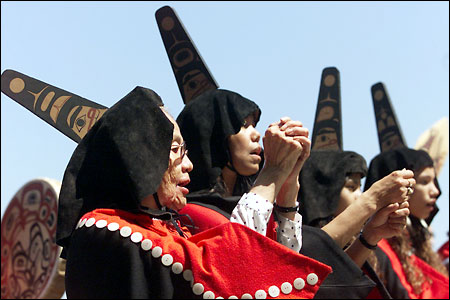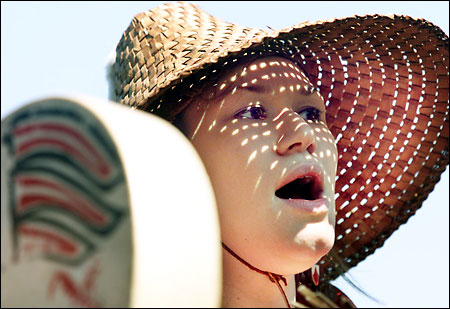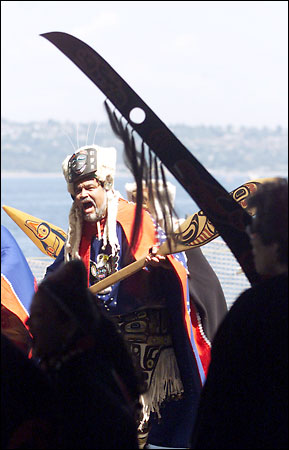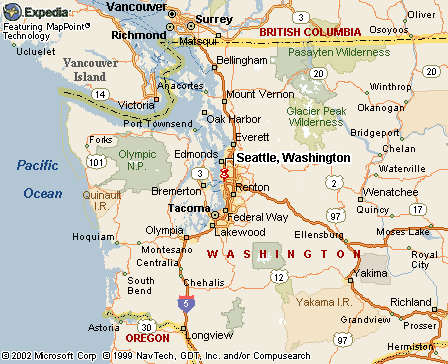|
|
Canku Ota |
|
||||||
|
(Many Paths) |
||||||||
|
An Online Newsletter Celebrating Native America |
||||||||
|
June 29, 2002 - Issue 64 |
||||||||
|
|
||||||||
|
As Old Friends, Tlingits Bid Farewell to Orphaned Orca |
||||||||
|
by LISA STIFFLER SEATTLE
POST-INTELLIGENCER REPORTER June 13, 2002
|
||||||||
|
credits: Photos
by Mike Urban, Seattle Post-Intelligencer
|
 ABOARD
THE EVERGREEN STATE -- Booming drums and undulating chants briefly drowned
out the TV news copter hovering nearby. ABOARD
THE EVERGREEN STATE -- Booming drums and undulating chants briefly drowned
out the TV news copter hovering nearby.
Red-and-black cloaks bejeweled with abalone shell-buttons and geometric renderings of whales shielded from view the half-dozen boats that buzzed around the little orca -- a rehearsal for today's attempted capture. Yesterday, more than a dozen members of Alaska's Tlingit Tribe gathered on the deck of the Evergreen State -- the ferry that plies the waters between West Seattle and Vashon Island and has become the killer whale's favorite motorized companion. They wished "Springer" well and said their goodbyes. "She comes up and sees us all the time," said Floyd Fulmer, a ferry worker and a Tlingit who came up with the idea of honoring the whale with a song and dance. "It's the right thing to do." With the deck as their stage, the tribal dance group performed a song from the Tlingit's Killer Whale Clan. Traditionally, it was chanted when canoeing among the orcas -- an attempt to communicate with the marine mammals. It was also a calling card of sorts, announcing a visiting clan's arrival to others.
Linda Green was joined by her two teenage daughters and 78-year-old mother. All wore black-suede hoods topped with a wooden dorsal fin. Across the backs of their handmade robes were images of arched, swimming orcas. "We feel related (to the orca)," Green said. Some performers wore deer-hoof ankle bracelets that tinkled as they pivoted and lunged through the dances. Soft white ermine pelts swung from headpieces worn by some. Others had hats of woven cedar. Orcas are sacred to the tribe, one dancer, Jack Strong, said afterward. That's because the Creator helped the Tlingits conjure a killer whale to rescue a captive Tlingit. He had been kidnapped by the sea lion people.
The Tlingit Tribe is from southeast Alaska and British Columbia. Performers yesterday were mostly Seattle-area residents; members of the Kuteeya Tlingit dance group. The orphaned orca "is displaced, just like a lot of natives from Alaska are," said Fred Fulmer, Floyd's brother, referring to the orca's separation from her family. There were mixed emotions over the planned return of the whale to her pod in Canada. "I hate to see her go, but I realize that she's sick," said Floyd Fulmer. As an engine room-maintenance worker, he would hear the orca chirping and squeaking when the engines were cut. Many of the ferry workers have developed an affection for Springer, who hangs around the Vashon Island docks. Some disapprove of her capture and export to Canada. They watched as the tribe performed their sendoff. "It almost made me cry," said Kellie Shillington, who directs traffic on the Vashon dock. "It's going to be so sad to see her go."
|
|
|
||
|
|
||
| Canku Ota is a free Newsletter celebrating Native America, its traditions and accomplishments . We do not provide subscriber or visitor names to anyone. Some articles presented in Canku Ota may contain copyright material. We have received appropriate permissions for republishing any articles. Material appearing here is distributed without profit or monetary gain to those who have expressed an interest. This is in accordance with Title 17 U.S.C. section 107. | ||
|
Canku Ota is a copyright © 2000, 2001, 2002 of Vicki Lockard and Paul Barry. |
||
 |
 |
|
|
The "Canku Ota - A Newsletter Celebrating Native America" web site and its design is the |
||
|
Copyright © 1999, 2000, 2001, 2002 of Paul C. Barry. |
||
|
All Rights Reserved. |
||
 Four
women spanning three generations were among the dancers during the afternoon
ceremony.
Four
women spanning three generations were among the dancers during the afternoon
ceremony.  "Ever
since then the killer whale has been friends to the man, and the man
friends of the killer whale," Strong said.
"Ever
since then the killer whale has been friends to the man, and the man
friends of the killer whale," Strong said. 